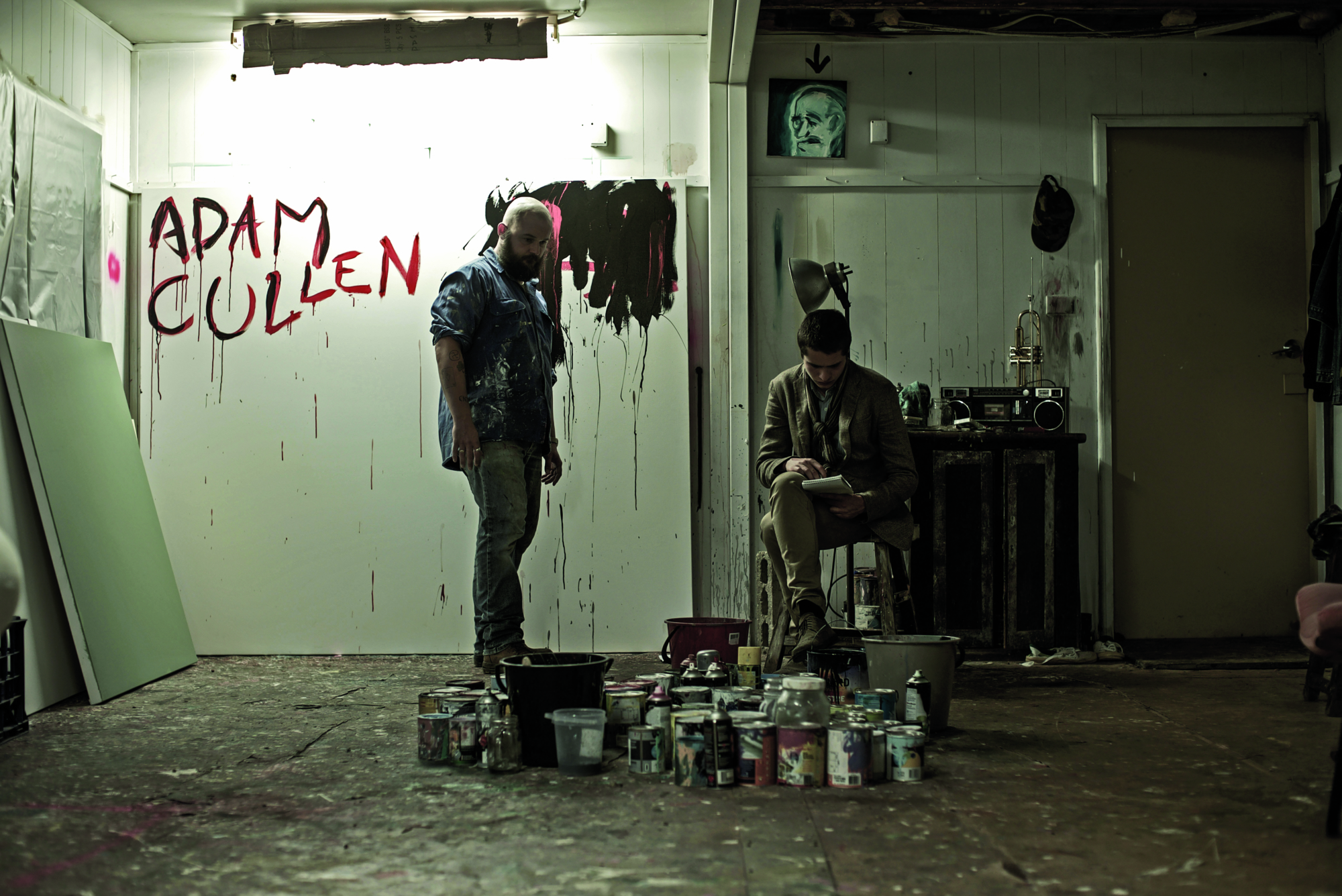‘I think something I am coming to realise as a journalist is that, when you write about other people, you hurt them in some way,’ Erik Jensen tells me. He says this knowing that I’m going to be writing about him. Despite his statement, he is generous in his responses and surprisingly forthcoming. No sound bites here. I suppose, given the reason we’re speaking, he’d be a hypocrite otherwise.
Our interview takes place in the week or so following the world premiere of Acute Misfortune (Thomas M Wright) at the 2018 Melbourne International Film Festival. In the little time that has passed, the film has already been getting good buzz[1]See, for example, Luke Buckmaster, ‘Acute Misfortune First-look Review – Adam Cullen Biopic Is an Enthralling, Complex Triumph’, The Guardian, 4 August 2018, <https://www.the
guardian.com/film/2018/aug/04/acute-misfortune-first-look-review-adam-cullen-biopic-is-an-enthralling-complex-triumph>; and Sarah Ward, ‘Acute Misfortune: Melbourne Review’, Screen Daily, 10 August 2018, <https://www.screendaily.com/acute-misfortune-melbourne-review/5131520.article>, both accessed 5 November 2018. – and, when the festival is over, it will go on to win The Age Critics’ Award for best Australian feature film.
Neither of us know this yet, however; in the current window of time, the film is freshly out in the world, and public and critical opinion is still in the earliest stages of forming.
Acute Misfortune is a film based on a book based on a true story, and the common component to all three is Jensen: journalist, editor and, now, co-screenwriter. In 2008, he was commissioned by the Archibald-winning artist Adam Cullen to write his biography, and told that there was a book deal in place. In good faith, and with a stack of notebooks in hand, Jensen started the interview and research process that would define the next few years of both of their lives.
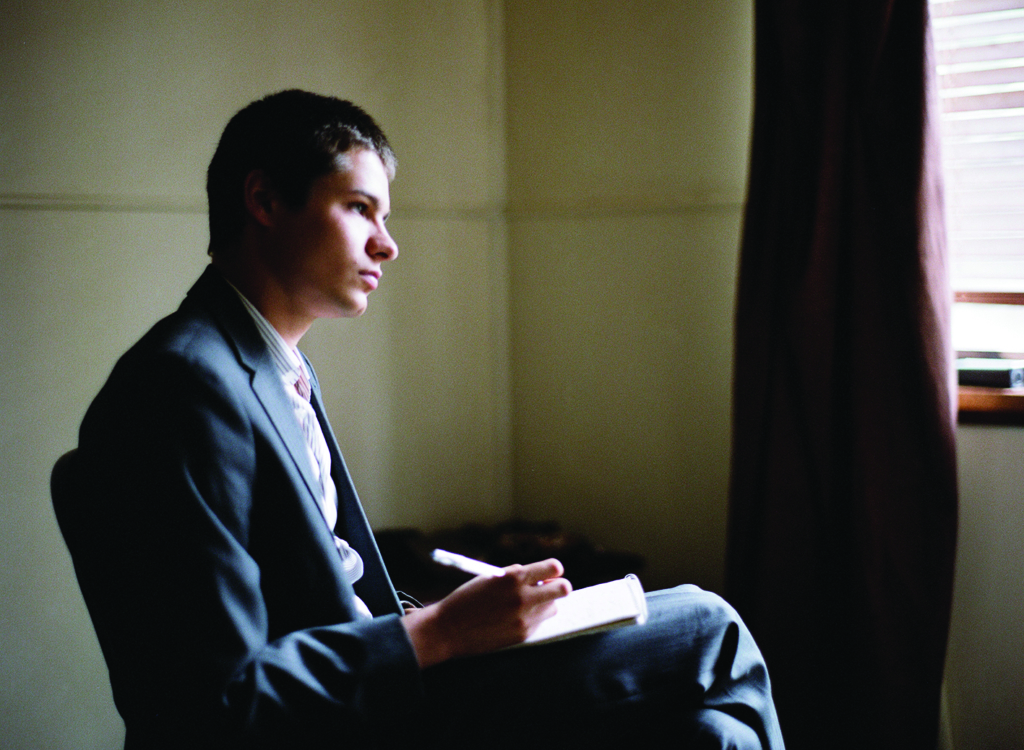
Instead of a straightforward assignment, though, it turned out that there was no book deal and that Cullen himself was volatile and violent, with his physical and mental health rapidly deteriorating. Yet, despite the lies and the danger, the two developed a close but destructive relationship, and, after Cullen died at the age of forty-six – four years after starting the project – Jensen decided to write a book all the same. The book, published in 2014, went on to garner critical acclaim: it won a prestigious literary award and was shortlisted for two others.[2]More information available on the book’s page on publisher Black Inc.’s website, <https://www.blackincbooks.com.au/books/acute-misfortune>, accessed 5 November 2018. Now, the story has found a new life – this time, on the big screen.
Both book and film look at the same window of time: the four years that Jensen and Cullen spent getting to know each other. It covers Cullen’s legal troubles, particularly his court case for gun possession. It captures the fraught relationship between writer and subject – Jensen was injured more than once by Cullen’s hand. And it chronicles the difficult relationship Cullen had with his parents, especially his mother, Carmel.
What makes Acute Misfortune unusual is Jensen. It’s his story almost as much as it is Cullen’s, and, by this point, he has experienced it in three different ways: living it; writing it, for the book; and rewriting it, for the screen.
Adaptation isn’t uncommon in cinema. But what makes Acute Misfortune unusual is Jensen. It’s his story almost as much as it is Cullen’s, and, by this point, he has experienced it in three different ways: living it; writing it, for the book; and rewriting it, for the screen. ‘It’s like a second chance at reality, making a film like this,’ he reflects. By this, he isn’t saying that it is a chance to revise history, or to spackle over any gaps or errors in his book; instead, he is alluding to how his involvement in the film has allowed him to take a look back at old events through a new, and perhaps more mature, lens.
The film, then, isn’t simply an adaptation – it’s an embodiment of its own, as well as the book’s, central themes: art, lies and hurting one another.
Art
Wright’s Acute Misfortune is carefully curated, using every one of its ninety minutes to its greatest potential. It’s also very deliberately a work of art in itself – from the way in which it is shot to its original score, composed by Evelyn Ida Morris, which elevates what might otherwise have been a slightly unusual not-quite-biopic into a film that, at times, feels both otherworldly and measuredly philosophical.
Jensen co-wrote the screenplay with Wright and, together, they have trimmed away any excess from the source text’s rendition of events. ‘It’s a very lean film,’ Wright tells me. ‘I tried to insist on every shot having its own narrative significance. There’s nothing in the film that I would say is superfluous.’ The original text is bookended by Cullen’s funeral and, in it, the artist’s long history with the Archibald Prize features prominently; in the film, the former has been cut completely, while the latter has been severely truncated. But the adaptation doesn’t suffer for it – if anything, it flourishes without being weighed down by excess context. Viewers still get a strong sense of Cullen’s art, his growing sense of isolation, his paranoia, his rage at his family, his desperate attempts to simultaneously shape and cement his legacy – and the spectre of his impending death hangs heavily over the film.
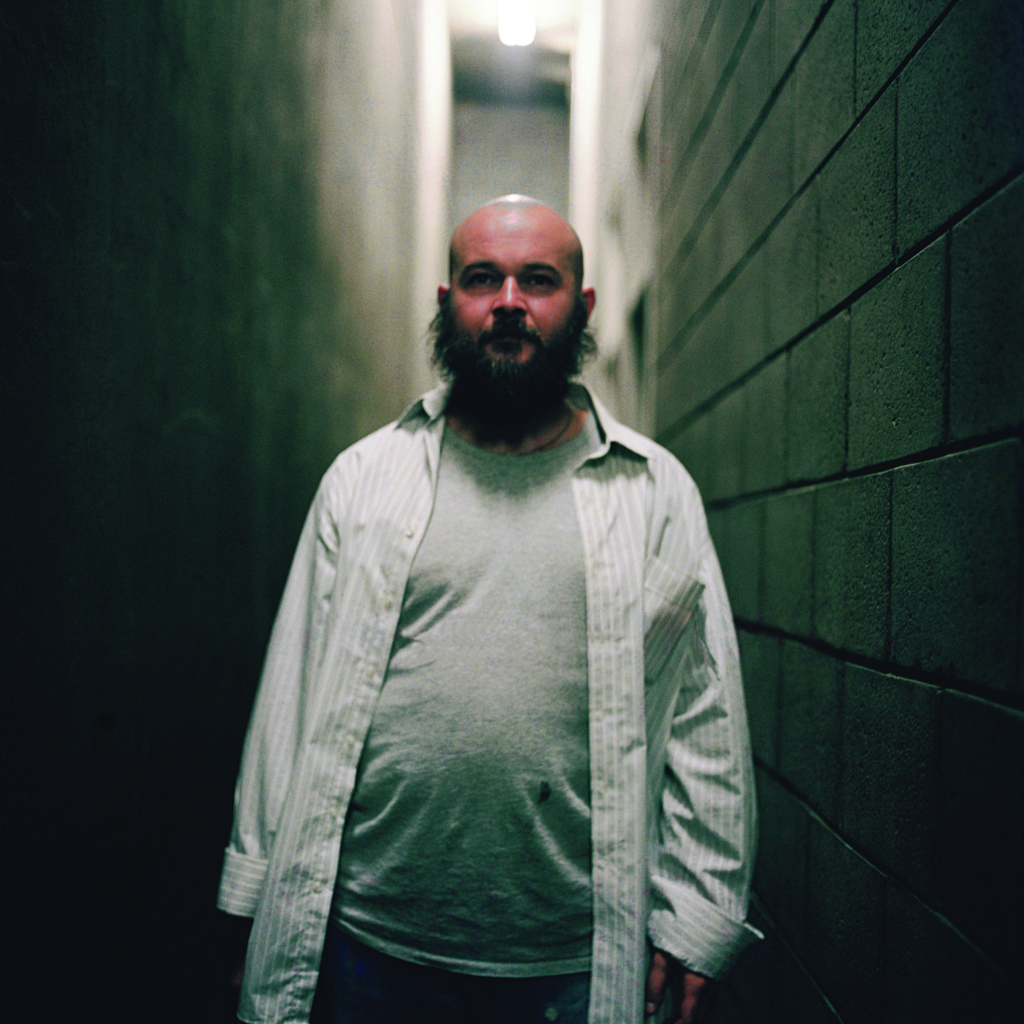
To underscore the film’s unavoidable conclusion, Wright made some unusual choices. One recurring motif is shots played in reverse. ‘With the backwards footage, I knew that I wanted the film to be loaded with these implications of inevitability,’ the director explains, ‘and the minute you reverse the arrow of time, you’re dealing with trying to remake meaning.’ In fact, every detail is carefully thought out. Acute Misfortune is shot in 1.37:1 aspect ratio to speak to the fact that this film is not just about an artist, but about taking stories from one another. ‘[The aspect ratio] implies portraiture,’ Wright says.
It’s medium format. Erik’s in the act of portraiture. Adam’s in the act of portraiture. It references Adam’s canvas sizes more closely […] and there’s also the subtle implications of claustrophobia that come with having the black on either side of the image.
Lies
In both the book and the film, Cullen is shown to be a liar, an embellisher of truth: he takes delight in telling journalists that his girlfriend has just left him, despite it being a clear fiction. He tells stories about being the driver for an assassination, despite the timelines not adding up.
Wright’s rendition holds true to the book as much as it can, though the film has adopted a more linear, chronological structure. There are small differences, though – on screen, events are slightly reordered, characters are moved around to places they never went in real life – meaning Wright and Jensen tread the difficult line of sticking to facts while presenting a cinematically cohesive and engrossing work.
I’m curious, however, about how it feels to finesse the details of things that actually happened to one’s own life in order to make a film more engaging for audiences. I ask Jensen about navigating the border between truth and lies when recounting personal experiences, and he responds: ‘The interesting thing is there’s very little in the film that’s not true. I would say something like 80 per cent of the dialogue in the film was spoken in real life – as in, it’s been taken straight from [my] shorthand notebooks.’
‘What you’re doing is reconstructing something of a true feeling from lies … the hugely difficult task of narrative-film writing and of a genre like this is to find a means to get close to the right feeling through, obviously, that collection of falsities.’
—Thomas M Wright
In the book, Jensen interrogates the idea of lies becoming facts once they have been put out in the world. I comment that, while I don’t consider reshuffling things to make a tighter film an act of deception, it isn’t quite telling the truth, either. ‘That’s true,’ he replies. ‘I also think we weren’t making a documentary, and the film feels, to me, truthful – and it’s truthful even if there are certain ellipses of plot.’
Wright is more matter-of-fact when it comes to talking about the spirit of a story vs the literal facts. ‘What you’re doing is reconstructing something of a true feeling from lies, when you’re making biographical cinema,’ he says. ‘And the minute you replace people with other people and you compress four-and-a-half years into ninety minutes, then you’re lying – and the hugely difficult task of narrative-film writing and of a genre like this is to find a means to get close to the right feeling through, obviously, that collection of falsities.’
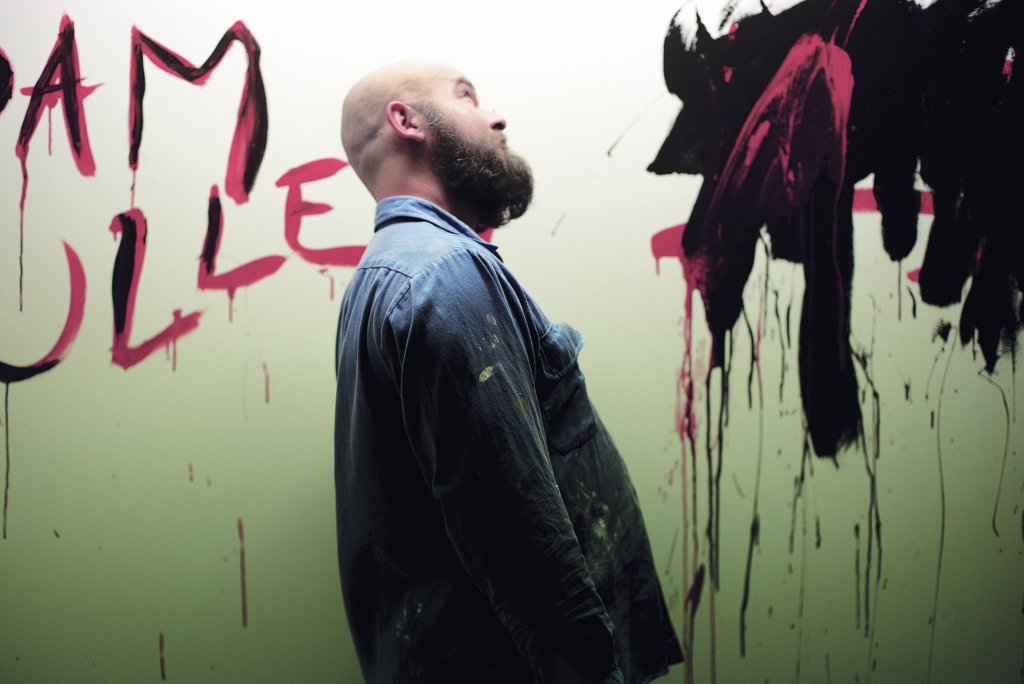
The biggest difference between the two texts is the lens through which the film is presented. In the book, readers see things from Jensen’s perspective. He is simultaneously the narrator and a character; everything is filtered through his viewpoint. On screen, in contrast, Jensen remains a character and, while it is an adaptation of his original work, viewers experience the story through the omniscient eye of the camera. To Jensen, this has the potential to make the film even more honest: the boundaries of ‘fact’ can become murky, and what is true for one person may not be for another. ‘I’m not worried about the lack of […] interior monologue in the film, in a way, because I actually feel like it is able to present facts in ways that are more emotionally direct than maybe any commentary in a book allows for,’ he says.
This also comes back to Jensen’s comment about the film being like a second chance at reality – within one person, understanding and interpretation of a situation can shift over time. Asked whether he feels that the depiction of himself on screen is accurate, he responds definitively: yes. ‘It’s not because [actor Toby Wallace] was attempting some kind of method interpretation of me,’ he clarifies. Instead, describing a visit to the set one day and watching a newsroom scene unfolding, he found Wallace
just engaging with the emotion of that moment in my life in a way that I felt was really authentic. When I watch the film, I feel as though I’m able to understand myself a little better – because I’m able to look back on a time when I was really not able to properly interrogate everything that was happening to me.
Hurt
Wright and Jensen are very positive about the experience of working together. At the same time, they’re open about the challenges that come with preparing a screenplay when one of the writers is also one of the characters being dissected for public consumption.
‘I think the interesting thing, for me, about the screen is that, when you write a book, particularly when that book is nonfiction, you don’t really have to interrogate the motive of every character,’ Jensen reflects. ‘When I wrote Acute Misfortune [the book], I was interrogating Adam’s motive, but I left mine fairly undisturbed,’ he says, with a laugh.
‘It gave us a huge blind spot about identifying the motivations of the character Erik for an audience,’ adds Wright. ‘That took a lot of time [during] the writing process to go through and really carefully diagnose the reasons that he would return, the reasons that he remained.’
‘That was, at times, a frustrating experience for me,’ admits Jensen.
But equally, when I watch the film now, I see the concern that Toby has for the character of me […] I see in Toby an empathy for my character that I didn’t necessarily always have for myself. It’s actually quite a moving thing to see how much he cares for the character he’s playing, and to see how scared and overwhelmed I was for a lot of the time I was working on the book.
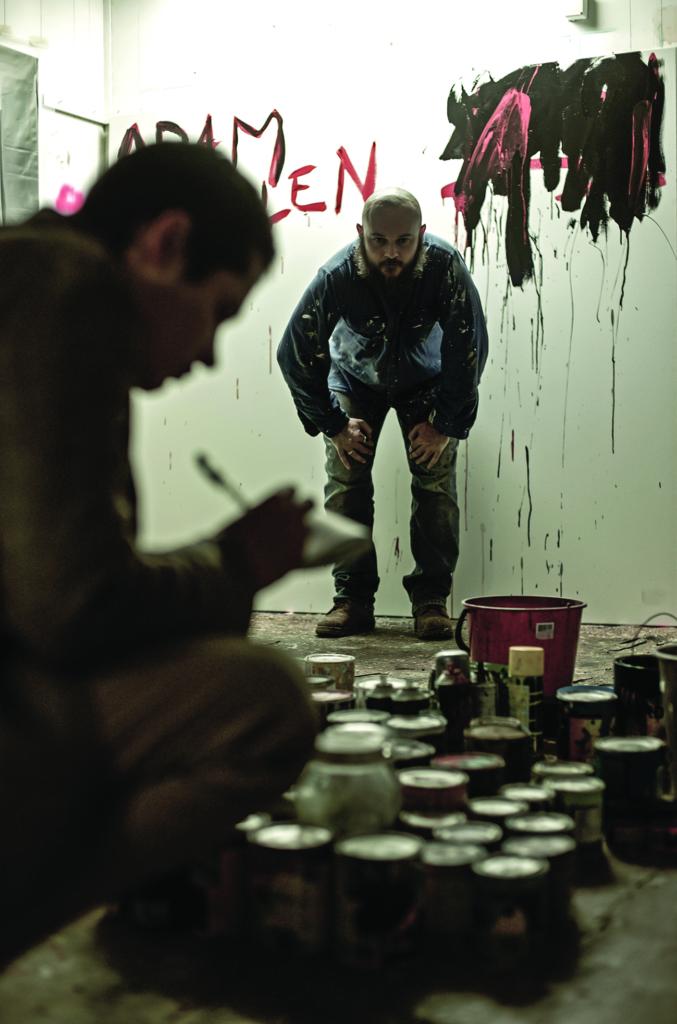
Throughout the interview, Wright keeps coming back to the idea of ‘theft’ – about how both storyteller and subject take from each other. ‘Adam obviously lied to Erik about the book deal, but Erik also steals from Adam,’ he muses. ‘We see him walking through the house and peering through [Adam’s] things. His journalistic impulse. I mean, from Erik, a direct quote is, “Journalism is theft or, at least, betrayal.”’
‘When you write about other people you hurt them in some way’ – it’s one of the first things Jensen says to me, and it’s because I have asked what it felt like to share his story with Wright, to allow someone else to cast their lens on it. He explains that, even if the story is small, not personal, the idea still applies, because ‘that person is in some way giving a part of themselves to you’: ‘When you write about yourself, you hurt yourself as well. And when you collaborate with someone and the story is about you, in some ways you’re going to be hurt or discomforted.’ He pauses.
That’s the reality of what we do as journalists, and it’s the same reality for filmmakers who decide to tell true stories […] Knowing that, when you’re going to work with someone and you’re telling a story that involves you, you have to be prepared for that story to, at some point, leave your hands.
Endnotes
| 1 | See, for example, Luke Buckmaster, ‘Acute Misfortune First-look Review – Adam Cullen Biopic Is an Enthralling, Complex Triumph’, The Guardian, 4 August 2018, <https://www.the guardian.com/film/2018/aug/04/acute-misfortune-first-look-review-adam-cullen-biopic-is-an-enthralling-complex-triumph>; and Sarah Ward, ‘Acute Misfortune: Melbourne Review’, Screen Daily, 10 August 2018, <https://www.screendaily.com/acute-misfortune-melbourne-review/5131520.article>, both accessed 5 November 2018. |
|---|---|
| 2 | More information available on the book’s page on publisher Black Inc.’s website, <https://www.blackincbooks.com.au/books/acute-misfortune>, accessed 5 November 2018. |
